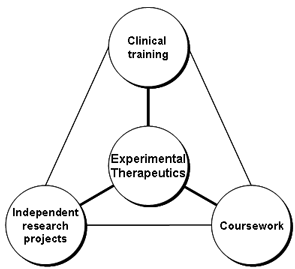Training
The Experimental Neurotherapeutics fellowship (NS-07338) at the University of Rochester is the only NIH funded fellowship specifically aimed at developing clinical researchers focused on neurotherapeutics in neurology. The program has been continuously funded since 1990 and since that time has trained over 80 fellows who are now at over 25 institutions. Virtually all fellows completing the program have secured grant funding as part of their training with many receiving multiple grants.
The fellowship, which can be completed in any field of neurology or clinical neuroscience, has four principal components:
 Clinical training – The University of Rochester has national and international leaders in neuromuscular diseases, movement disorders, epilepsy, HIV, memory care, multiple sclerosis, neuro-oncology, neuro-critical care, palliative care, pain management, vascular neurology, pediatric neurology and global neurology. While in the T32 fellowship, trainees continue to gain clinical experience in their subspecialty of interest, focusing on clinical work that contributes to their career development and research needs.
Clinical training – The University of Rochester has national and international leaders in neuromuscular diseases, movement disorders, epilepsy, HIV, memory care, multiple sclerosis, neuro-oncology, neuro-critical care, palliative care, pain management, vascular neurology, pediatric neurology and global neurology. While in the T32 fellowship, trainees continue to gain clinical experience in their subspecialty of interest, focusing on clinical work that contributes to their career development and research needs.- Coursework – Training in biostatistics, clinical trial design, bioethics, and grant writing, is tailored to the needs and interests of the Trainee. Most fellows complete coursework for the Advanced Certificate in Experimental Therapeutics.
- Experimental therapeutics – The heart of the fellowship is training and first-hand experience in experimental therapeutics, the design and conduct of clinical trials, funded by NIH, foundations, and industry. Trainees, depending on their interests, can work with investigators on designing first-in-human studies to translate therapies from animal models to humans, serve as site investigators, help plan phase III clinical trials, or all of the above.
- Independent research projects – Trainees may come with their own research projects that they want to continue, or develop new research interests during the course of their fellowship. To help pursue these ideas, Trainees are mentored and expected to write their own grants. Trainees in the program have successfully competed for NIH career development (K) awards, American Brain Foundation fellowships, NIH Loan Repayment awards and foundation awards.
Typical Curriculum for ExNT Trainee
| Year 1 | Year 2* | ||
|---|---|---|---|---|
| July-December | January-June | July-December | January-June |
14-credit curriculum customized to Trainee’s career development needs | ||||
Mentored Research Project(s) | Mentored primary and collaborative research projects | |||
| Program-wide Meetings | ||||
| Working Group on Clinical Research | Meetings involving faculty, trainees, or guest speakers to discuss experimental therapeutics issues, in particular the design, analysis, outcomes, and future plans for research | |||
| Mellow Fellows | Seminar focused on trainees practicing oral presentation skills as they brainstorm new ideas or troubleshoot current work with experienced investigators, biostatisticians, and peers | |||
| Career Development Seminar | Seminar focused on career development skills and mentoring for career guidance and opportunities | |||
| Invited Speakers for Quantitative Skills | Biannual presentations; Annual Michael P. McDermott Lectureship in Experimental Therapeutics | |||
Other Mentored Activities | Skills building for leadership, oral and written communication, diversity training | |||
Mentored Grant Writing** | Prepare and submit next grant within 18 months | |||
Annual T32 Workshop | Attend at least once during training | |||
Clinical Activity | Subspecialty clinics aligned with research goals; usually 10-20% of effort. | |||